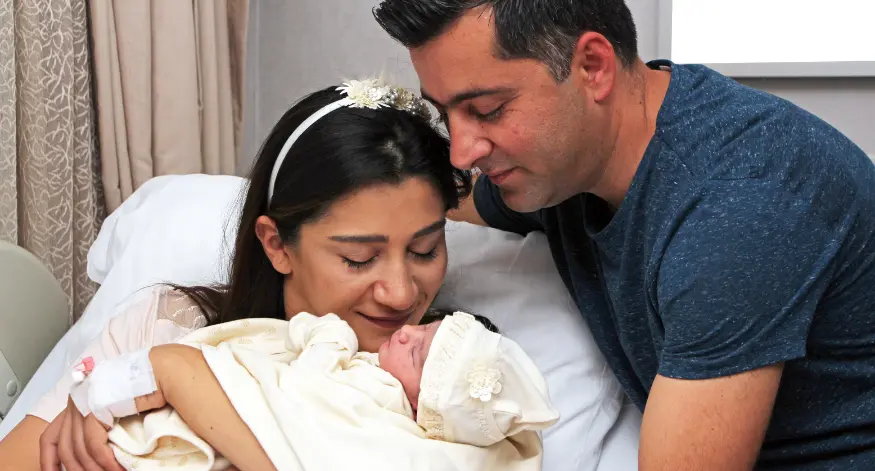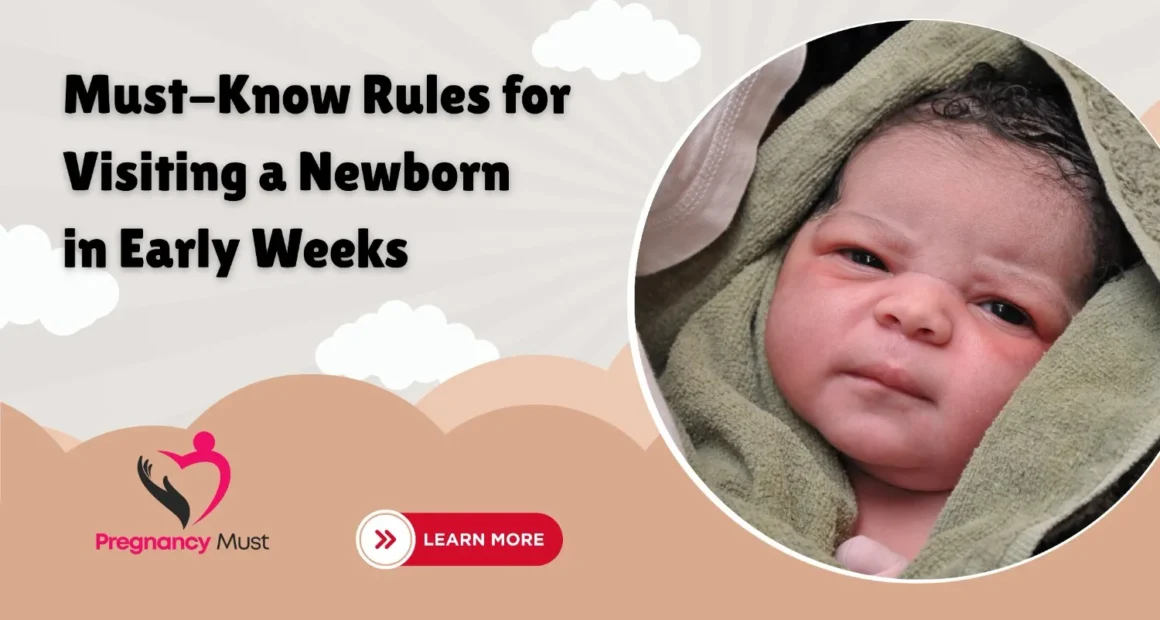Rules for visiting newborn babies are not a matter of being overly cautious—it’s about protecting your little one during their most vulnerable stage. Bringing home a newborn is a moment that is most treasured in life; however, there are serious health concerns, including visitors. This is your ultimate guide to when to have visitors and how, what to expect, and what to do after giving birth when it comes to visitors.
Table of Contents
Why Rules for Visiting Newborn Matter

The infants are born with young immune systems that are not able to protect against common viruses, infections, or bacteria. A baby several days or weeks old may be at risk even when adults have mild symptoms such as a cough, shiver, or sniffle. That’s why pediatricians recommend creating a clear set of rules for visiting newborn for anyone eager to meet your baby.
Not only does this help your child not get sick, but this creates respectful boundaries so that life is not so stressful during those hectic weeks after a child is born. The emotional and physical healing of parents and the baby is best aided in an environment of low stimulation and comfort. Setting up formal rules initially reduces painful negotiations in the future and does a better job of creating a safer, more supportive situation all around.
When Is It Safe for Visitors to Meet Your Baby?

General Timing Recommendations
So, when should family visit newborn? our answer will be tied to a couple of factors: the health of your baby, your comfort, and the recommendations by the public health.
- Most pediatricians recommend following the “newborn no visitors for 2 weeks” rule
- Preemies or infants with medical conditions are high-risk patients, and visitor restrictions may have to be longer.
- All visitors must be well vaccinated, asymptomatic, and avoid poor hand hygiene.
Hospital Visitor Policies
You might wonder, when can visitors see the newborn in hospital? Most hospitals restrict visitors after birth to expedite the family and have strict newborn visiting rules. Access can be restricted in some maternity wards according to existing health requirements or those of the staff. Unless you want to become disappointed at the last moment or get into confusion altogether, make sure that you examine your birthing center policy beforehand. Rules for visiting newborn can not be ignored when it is the very first week.
Seasonal & Community Health Risks
If you’re wondering when family should visit the newborn, consider your baby’s age, immune strength, and the health risks in your community. In case of the flu season or even RSV visits, most pediatricians would advise you to wait even longer. When you have a premature or a sick child, it is particularly important to wait visiting a newborn.
Common diseases can attack even a healthy full-term newborn. When to allow visitors newborn visitor should always be a decision based on the pediatrician’s input and your personal comfort level.
Impact of Time of Year
The period in which your baby is born is a strong factor. The season of winter usually periodically increases in respiratory illnesses caused by the virus type RSV, flu, and cold. Even good friends bring germs into your home by not knowing it. That is why most parents restrict the visits to warmer weather or till a baby is a bit older.
One good approach will be to avoid the visiting times during the peak of cold and flu seasons to reduce the risk factor, and favorable bonding time with your newborn baby.
Delaying for Safety
Infants who are delivered during the colder months are more exposed to seasonal diseases. Even a couple of minutes with an acquaintance can bring in germs that the system of a newborn is not mature enough to defend against. Parents would be advised to be on the lookout, especially when those who visit have recently traveled or been in large gatherings of people, or were feeling a bit under the weather.
It might be quite hard to postpone visits because of the emotional cost of it, but it is a temporary measure to ensure the health of your baby in the long run.
CDC Advice on Newborn Visitation

No Official Mandate, But Strong Recommendations
The CDC does not give a specific commandment concerning newborn visitors, yet its recommendations are quite extensive, as it encourages the reduced exposure of a baby in his/her first weeks. This is one recommendation that protects the infants whose immune systems are still developing.
How Long Should You Wait?
- A guideline like newborn no visitors for 6 weeks is often recommended if the baby was born prematurely, has underlying health concerns, or there’s an active viral outbreak (e.g., flu or RSV).
- Some families choose a more conservative plan, like newborn no visitors for 6 weeks, CDC, while others may follow pediatrician advice and allow visits after 2 weeks for full-term, healthy babies.
Whatever your timeline, always consult your child’s healthcare provider.
Vaccination Requirements for Visitors
CDC highlights that fully vaccinated individuals should visit a newborn, especially in the cases of:
- Influenza (flu)
- Tdap (whooping cough)
- COVID-19
Also, in case a visitor has recently fallen ill or traveled to another country or was in contact with a person who had the disease, it is best to postpone the visit until the visitor is not experiencing any illness and has been evaluated by a practitioner.
Interpreting CDC Guidelines
The CDC provides loose guidelines that are open-ended to the extent that parents and providers can be flexible to change according to their health situations. However, though you may not follow the 6-week guide, it is an excellent guide to ensure that you allow your baby the time to grow stronger.
Local Health Conditions Matter Too
Nevertheless, pay attention to the regional health warnings and new threats. You might be told to delay even longer when a large number of people are ill with all these respiratory infections (such as COVID-19 or pertussis). By regularly checking the updates provided by the local health department, you will be able to maintain policymaking that will be relevant to your region.
CDC-Aligned Tips to Minimize Risk
✅ Delaying Non-Essential Visits
Postponing the visits will give an opportunity to your infant to boost his/her immune system. It also minimizes contact with the common viruses transmitted by asymptomatic adults or kids. Physically and psychologically, external isolation during these initial weeks provides expedition and security in your home.
✅ Prioritizing Cleanliness & Mask-Wearing
Visitors should be encouraged to wash their hands, come in without shoes, and with masks in the case of high levels of illness, or other children at home. When the environment is clean, the possibility of transmission of diseases is drastically minimized.
✅ Staying Up to Date with Vaccines
Ask the visitors to have the necessary vaccines, especially whooping cough vaccines, flu, and COVID-19. Being vaccinated reduces the probability of transmissibility of any infection to fragile newborns and demonstrates empathy for your health interests.
✅ Avoiding Public Spaces Early On
In the initial weeks, do not expose your baby to large indoor spaces that include malls, grocery stores, or family get together gatherings. These zones have a high risk of exposure and must not be visited unless there is a medical urgency.
Visitor Etiquette: What Family and Friends Should Know

Here’s a quick etiquette guide for visiting a newborn:
- Always ask before visiting— do not just appear. Parents can be feeding, resting, or attending to household chores. Choosing to respect their time will be considerate and allow them not to neglect their time. Advance scheduling enables the parents to get ready, have a rest, or even refuse without feeling guilty.
- Don’t come if you’re sick or have been recently exposed to illness. A newborn can be put in serious danger even with minor symptoms. A cold and fever, or even a stomach bug, are something you should without any doubt wait to get out of before working out. Wait until you are 100% symptom-free so as to prevent any possible health complications to the baby.
- Wash your hands thoroughly before holding the baby. Warm water and soap should be used for at least 20 seconds. Sanitize a second time whenever you have touched something such as your face, phone, or any other thing throughout the visit. Washed hands help to decrease the chances of transferring bacteria and viruses to the baby whose body resistance is not yet developed.
- Avoid kissing the baby, especially on the face or hands. Kisses are sweet, but the transfer of dangerous bacteria and viruses, with kissing can happen. Smooching should wait until the immune system of the baby is better developed. Even very innocent kisses may include cold sores or RSV, which is potentially life-threatening to babies.
- Limit visit duration—new parents need rest, not extended company. A reasonable amount of time is between one hour and less. Long visits may disrupt the feeding process and result in the parents and the baby being overtired. Short visits help express a caring attitude as well and will not disrupt the fragile schedule of the life of a newborn.
- Leave if the baby gets fussy—sometimes peace is the best gift. A fussy baby may require to be fed, swaddled, or given a nap, and less noise allows them to calm down faster. It is not very mature to be insensitive to the cues of the baby.
- Avoid wearing strong perfumes or smoking before arrival—newborns are sensitive to smells and chemicals. They can be irritated by their respiratory tracts by fragrances, and clothes may be dangerous even when you are smoking outside, as the remnants of smoke remain on them. Wear neutral clothes, with a clean smell, and avoid perfumes altogether during visit day.
Preparing the ground ahead of time will guarantee that people are satisfied without putting your newborn at risk. Explain to them that the boundaries have nothing to do with trusting other people, but what is best regarding their baby’s health and your mental soundness.
Your Right to Set Boundaries

Many parents hesitate to enforce rules for visiting their newborn, worrying about offending loved ones. “Rules for visiting our newborn” should be mandatory. However, it is not impolite to ensure that your baby is not exposed to the virus because it is your duty.
- These are some of the agreeable ways to draw limits here:
- Before birth, use emails or group texts to describe your visitor policy
- Frame it on baby being healthy rather than on his/her taste
- Provide the option of virtual visits
Adopt an easy manner:
“We are so thrilled to present our baby soon. To prevent infections and to ensure the safety of all people, we request that no face-to-face visits be organized until [date]. You appreciate it!”
Even a simple visual flyer with dos and don’ts can be created. Communication also avoids embarrassing discussions in the future, and it makes people feel like they are on the same page.
Frequently Asked Questions (FAQs)
Q: When should family visit newborn?
A: Ideally, it is supposed to be after 2-6 weeks, after both the baby and parents have settled and immune protection is stronger.
Q: When to allow visitors newborn?
A: Once you are willing and your pediatrician considers that it is safe, particularly when the visitors are also vaccinated and healthy.
Q: What are some common newborn rules for visitors?
A: Wash your hands, don’t kiss, come visiting when you are not well, ask permission, and you oblige quiet time.
Q: What if someone ignores our newborn rules for visitors?
A: Reiterate your concerns politely but firmly. Your baby’s health is your top priority.
Conclusion
Establishing rules for visiting newborn babies isn’t just a parenting trend—it’s a health necessity rooted in science, safety, and respect. Having clear expectations and acting per the recommendations by the experts, you guarantee a healthier start for your little one and an easier experience for all involved parties.
It is not time to keep quiet. It is necessary for the health of your baby. Clear lines are now put in place that will avoid future conflicts and miscommunications. It is important to remind that as a parent, your instincts are valid. The people who are really on your side will respect whatever decisions you make, not completely cognizant of that decision at the onset. Focus on peace, security, and the interest of your family, which is on the way.
Ready to Set Boundaries?
Pass this advice on to family and friends so that they know what to expect and will ensure your newborn remains safe on the first day.
Stay with Pregnancy Must. Wishing you a safe and secure parenting.









